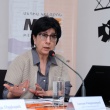Russia and the South Caucasus: Agendas, Priorities and Realities-2019
On August 20-21, 2019, an online conference was held on the topic "Russia and the South Caucasus: Agendas, Priorities and Realities-2019" on the Public Dialogues website (www.publicdialogues.info). The conference was organized within the framework of "Public Dialogues for Communication between Armenian and Azerbaijani Specialists" project, implemented by Region Research Center.
This project is supported by the Black Sea Trust for Regional Cooperation of German Marshall Fund.
The Institute for Peace and Democracy (the Netherlands) is a partner to the project. The Public Dialogues website was established in 2012 by Region Research Center and the Institute of Peace and Democracy, which was active in Azerbaijan at that time.
Who participated in the discussion?
Anush Sedrakyan (Armenia) - political scientist
Hikmet Haji-zade (Azerbaijan) - President of the FAR Center
Gela Vasadze (Georgia) - Political Consultant
Andrey Areshev (Russia) - editor-in-chief of the Scientific Society of Caucasian Studies website www.kavkazoved.info
The conference was moderated by Laura Baghdasaryan (Armenia), Director of Region Research Center.
What issues and aspects were discussed?
- The agendas of Armenia, Azerbaijan and Georgia in terms of orientation towards Russia, and vice versa, the priorities of the Russian politics in the South Caucasus in general and in relation to the countries in the region.
- Another crisis in the relations between Tbilisi and Moscow (June 2019) and its consequences for the Georgian and Russian capitals, invested in Russia and Georgia respectively.
- Mutual interests that precondition cooperation between Russia and South Caucasian countries.
- The process of rubbing and fitting between the new authorities of Armenia and the Russian leadership at the moment and the context of the criminal prosecution against the second president of Armenia.
- Mutual understanding between the leaders of Russia and Azerbaijan as demonstrated, what is the reality like?
- Conflicts, as levers of influence on the countries in the region.
- Domestic political significance of the Russian theme in the South Caucasian countries.
- Rationalization of the domestic policies, pursued by the countries in the South Caucasus and by Russia. What can this yield in practical terms for regional cooperation?
- The impact of wider geopolitical contexts (Russia / USA, Russia / EU, Russia/Ukraine, the Syrian crisis, etc.) on the policy of Russia in South Caucasus.
- The next stage of the Russian-Turkish rapprochement, how is this reflected in the South Caucasus region and its countries?
- The Iranian crisis and its potential consequences for South Caucasian countries.
A number of derivative issues and realities of 2019 were identified, analyzed, or discussed, which, to varying degrees, affect or may affect the interests of the countries in the region.
"Russia and the South Caucasus: Agendas, Priorities and Realities-2019"
Excerpted from the online-conference materials (August 20-21, 2019)
(The full text is available at: http://www.publicdialogues.info/node/867)
On the June Aggravation of Russian-Georgian Relations
Gela Vasadze – Why and how did this happen? The growth of economic and cultural ties between Georgia and Russia, which began even under the previous regime, since the position of the Georgian authorities after the 2008 war implied maximum openness for Russian citizens in the absence of political contacts, led to the Russian leadership (or its specific parts) to have an illusion: the Georgians were ready for the restoration of political contacts and the recognition of "new political realities" in the person of the "independent" Abkhazia and South Ossetia. The degree of discontent within the society grew and gradually reached a critical level ... It must be well understood that there is absolute consensus regarding the issue of occupation in the Georgian society. Even the position of the “pro-Russian” political forces (in Georgia - Editor) is that we should not fight, but settle, and then Moscow will return everything. By the way, this position differs from the position of the "anti-Russian" forces only partly, since the latter do not believe in the possibility of reaching an agreement with the current authorities. Thus, the case of Gavrilov was only the trigger, but such a development was inevitable. Well, the so-called "Gavrilov’s night" shifted all events into the domestic political format.
Andrey Areshev – ... As a Russian politician said a year ago, "... if the Georgian side wants to develop relations, we are ready for this, we have talked about it many times. If they don’t want it, it is just fine, so no need." So in this regard, it seems the approach was and will be pragmatic, with specific conditions, of course.
Gela Vasadze – But what about the “If they don’t want it, it is just fine, so no need” part? A Russian politician bent the truth here a little. Let's be pragmatic, let's look at the structure of the Russian business in Georgia and its importance for Russia. I'm not talking about the personal interests of individual influential citizens, this topic is no less interesting. Why are Georgian authorities (both incumbent and former) not using the real levers they have? The question is extremely interesting. And here there really are no complaints against the Russian authorities ... Regarding the suffering business and tourism. Here, as it often happens, the devil lurks in the details. And the details are numbers. Recently, I have multiply seen absolutely wild assessments of the damage to tourism that I even doubted it myself. The data of the State Statistical Committee and the assessments of both independent financial institutions and the government, which really wanted to write off their mistakes for the crisis, confirmed that there is no serious damage to the economy ... There is damage to specific people who focused on working with Russian tourists, and the damage they incur is really serious. I feel sorry for the people; ironically, they were the ones who contributed to the restoration of Russian-Georgian relations.
Laura Baghdasaryan - The loyal attitude of the Georgian political establishment and society as a whole towards cooperation between Georgia and Russia in a number of areas, except politics, is a distinctive feature. However, at the same time, Russia and Russian issues are turning into a mobilizing domestic theme for Georgia. When references are made to the mood of the Georgian society, I get an impression that these references play an exclusively domestic and foreign policy function.
The phenomenon of public sentiments in June 2019 clearly demonstrated the duality of the situation in Georgia. By the way, both on the Georgian and the Russian side, at least at the level of Russian tourists. How shall this factor be assessed for Russia and Georgia?
Gela Vasadze - Certainly, the topic of relations with Russia, or rather the topic of occupation, is a mobilizing factor. This is a win-win question - you talk about occupation, and no one will object. This, by the way, is an indicator of moods. ...Look how interesting it turns out to be, everything is quite simple in political relations between the Russian Federation and Georgia: as long as there is a fact of occupation, restoration of political relations with the Russian Federation is impossible. We talk a lot about this and we are milling the wind. Economic relations and especially issues of ownership of state corporations by the Russian Federation in the field of natural monopolies in Georgia are a topic of great interest, but no one talks about this, or they speak about this very superficially.
On the Domestic Political Significance of the Russian Theme in the South Caucasian Countries
Laura Baghdasaryan - In the morning I wrote about the factor of internal political culture and its significance for pursuing foreign policy partnership, too.
Judging by the media narratives in Russia, this huge country with a population of almost 150 million people has no problems of internal governance, administration, arrangement of public relations, except for issues of foreign policy importance – the USA, Ukraine, Syria, the arms race and much more. The refusal to register a number of candidates for participation in the Moscow Duma elections and the dispersal of rallies in Moscow, on the one hand, and the discussion topics these days on the programs of Russian TV channels, on the other hand, clearly demonstrated this gap between the real life of the country and the explicit myths about a hostile environment, also created by partner countries. I have a feeling that the fight against the so-called collective West is so prevailing over everything else that Russia treats its partners with emphasized suspicion. What if something happens? Meanwhile, every country has its own special significance for Russia. At least from the point of view of Russia's internal security. The very Georgia has not yet lost its significance for the settlement of certain issues in North Caucasus, a region that is so important and complex for Russia. Azerbaijan plays a definite role in this regard in terms of Dagestan. Armenia, if you just take only the domestic political dimension for Russia, nominally can play a role from the point of view of its huge diaspora, in my opinion, the 4th or 5th largest on the list of Russian national diasporas.
How does Russia evaluate the domestic political significance of its relations with the countries in the South Caucasus? Judging by the various results of opinion polls conducted in Russia, the attitude towards Armenia, Azerbaijan and Georgia is not always commensurate with the voiced political slogans in Russia itself.
Hikmet Haji-zade - Much has been written here about the search for new schemes in relations between the republics of the South Caucasus and Russia, but all these are dreams... Russia is so much stronger than the republics of the South Caucasus, either individually or combined, that it can afford not to notice our noble intellectual efforts. According to the Kremlin, we should all just shut up and do what is dictated to us. Nagorno Karabakh is a hook on which both Armenia and Azerbaijan are hanging. Whoever wants to escape to the West will not receive Karabakh (the same is with Abkhazia, probably there are politicians in Georgia who hope that the proclamation of toasts for the health of the Kremlin rulers can return to Abkhazia). And now, both Armenia and Azerbaijan go out of their way to prove their loyalty to the Kremlin and, thus, establish their jurisdiction in Nagorno-Karabakh. As for the “rapprochement of the Russian-Azerbaijani establishment,” it is not there. These are just the dreams of the current Azerbaijani elite, which thinks that if they indulge Moscow in everything, Karabakh will be returned to them. In fact, the Kremlin has one big demand – to return to its full influence in Azerbaijan by bringing the Russian troops back (they were withdrawn from Azerbaijan back in 1993). This demand is part of the Kremlin’s plan to resolve the conflict - Yerevan must return some of the occupied territories, but “to establish trust and lasting peace,” peacekeeping troops should be brought onto the confrontation line." And whose troops will these be? Of course, Russian! Azerbaijan, as you can see, has not agreed to step in this direction, hoping to resolve the issue by mutual awards of friendship medals and minor concessions in the economic and foreign policy spheres, so there is no rapprochement so far.
Gela Vasadze - The theme of the importance of our countries for the Russian Federation, each individually and all together, is a topic for a book, and not just one. The problem is that not only our neighbors, but also our own population and even some of our experts do not fully understand what this very significance consists in. And here you need to consider each topic and even each individual case very carefully. For example, how significant the company GruzRosEnergo owning power lines in Georgia is for Russia. Or how important the question of connecting the Baku-Tbilisi-Kars railway with the Trans-Siberian Railway is significant to Russia to transport its and not only its cargo to Turkish ports, as the railway passes through the Georgian territory and for which Georgia pays a loan of $ 700 million to Azerbaijan. The list goes on, and it is quite long. But this is what lies on the surface. There are other questions, for example, the issue of Russian migrants in Georgia. According to official figures, there are more than 80 thousand people. These are people who have a permanent residence permit in Georgia. In fact, they are many times more, Georgia simply has a very liberal migration legislation, one can live here for a year without any permission, leave for a couple of hours and reside again for another year. Is this a question of interest to the authorities of the Russian Federation? I don’t know, but I know for sure that in the same Azerbaijan and in the same Armenia people know very little about this. I mean that we know very little about each other and even less about our opportunities.
Anush Sedrakyan - Let me begin the discussion with the domestic political dimension of the Russian theme from the point of view of my European colleagues. Thanks to the zeal of some experts, the West was confident that the pro-Russian course of Armenia was steadily connected with the former corrupt regime of Armenia, which supported the Russian vector in order to stay in power. With the advent of Pashinyan, this confidence was shaken, because the opposition leader, who curtsies towards the West, in fact secured all existing agreements with the Collective Security Treaty Organization and the EAEU when he came to power, thereby confirming that for him democracy and Westernism are not identical.
Gela Vasadze - To understand the role and importance of Russian topics in the domestic political life of Georgia, I will give examples of comments on the 11th anniversary of Russian aggression (in August 2008 - Editor).
Opposition - Russia attacked Georgia and only Putin is to blame.
Pro-Russian parties - Russia attacked Georgia, but it was provoked by Saakashvili, it was his fault.
Authorities - Russia attacked Georgia, and Saakashvili these days acted on the side of Russia, that is, he is a traitor.
That is, relations with the Russian Federation are a topic for accusations. At the same time, the overwhelming majority of the Georgian population is for good neighborly relations with the Russian Federation, but only after the main problem - the occupation of Abkhazia and the so-called South Ossetia - is solved. The accusations of being pro-Russian are the most serious ones for any political force in Georgia, which in general is easy to explain.
Hikmet Haji-zade - In my opinion, Armenia is an outpost for Russia in its strategic plans of defending the southern flank of the Russian Federation against the Turkish and NATO hordes, hiding in anticipation of an opportunity to seize the Russian lands and resources. In general, paranoia, which has swept the ruling circles of Russia and Armenia, rules here. I do not observe any other noticeable cooperation, say, in the economic or transport sphere, but perhaps I am poorly informed.
In the historical, cultural and religious sense, Azerbaijan is a country that is strange for Russia, a country from a different civilization, and the tale that Russia saved the absorption of this country by Turks and Iranians does not work here. The country is a stranger, but a tidbit due to its resources and geographical location - at the junction of all routes from north to south and from west to east. Azerbaijan cannot be missed. Neither the Turks nor NATO will be allowed here. But we must plant the country, say, on the Karabakh hook and impose a partnership on it. And now the interaction and partnerships we see happening are not voluntary, but imposed. Formally, the partnership between Russia and Azerbaijan can be observed in many areas. But this is an imposed partnership.
Georgia is the main problem of the Russian Federation in the South Caucasus because of its desire for independence from Moscow. And so it was, back in the Soviet times. And today, if Georgia is missed, Azerbaijan and the republics of Central Asia will rush away from Moscow through Georgia to the open world seas. Georgia must be punished, and a partnership should be imposed on it, to tie it with a stronger bond... And, of course, stop NATO’s penetration into Georgia.... 20% of the Georgian territory is seized, “Borjomi” is declared expired, and the wine has gone sour. But all this doesn’t help. The Georgian society continues to move to the West in spite of any losses... You can’t win love by force.
On the Impact of the Russian-Turkish Rapprochement and the Iranian Crisis in the Countries of the South Caucasus
Anush Sedrakyan - To begin with, what kind of geopolitical problems the region may face no matter where it heads, since, with the exception of Georgia, the ambitions of regional players are in the sphere of territorial and economic interests. Neither Armenia nor Azerbaijan have ever voiced pro-Western policies at the state level. On the contrary, Armenia has repeatedly confirmed its direct dependence on Russian political vectors, and the interests of Armenia have always been subordinated to the interests of Moscow.
For example, voting at the UN, where Armenia practically voted against Georgia, although our bilateral relations have no right to be exposed to such political risks.
The situation brewing around Iran will certainly hit Armenia’s banking and commercial interests economically, but the sanctions will be less noticeable, as recently the US ambassador to Armenia deliberately voiced an understanding of the situation of besieged Armenia and the importance of an open Iranian border for our country.
A much greater threat to Georgia and Armenia is the growing Russian-Turkish cooperation, since Georgia’s marine territories are poorly protected, and even the presence of large Turkish investments in the country will not be able to prevent possible aggression if Russia and Turkey decide to start a joint advancement.
For Armenia, this cooperation may result in a complete economic blockade, not to mention the risks of possible cooperation between Turkey, Iran, Qatar, Syria and Russia. The creation of this energy alliance I fraught with a lot of trouble for us.
Gela Vasadze - The dispute between Moscow and Brussels, Washington and Beijing over us, the South Caucasus is a dispute over how these big forces can establish their influence in our region - directly from their own centers or through Moscow. What we are witnessing right now, the relationship between China and Azerbaijan, is a vivid illustration of this. The experience of Georgia shows that direct contacts with centers of power are far from being always safe and effective. Ultimately, at one time it was the Russian Empire that brought Europe back to the Caucasus, but the problem is that the Russian Empire was Europe then, and there wasn’t much choice.
Here is another stage of the Russian-Turkish rapprochement. How is this reflected in our region and in our countries? It leads to anxiety, although it would seem there is nothing to feel anxious about: the Turks have a very utilitarian approach to foreign policy – we will go for whatever is beneficial to Turkey, and we will not care for the rest. By the way, this is an example of all the same subjectivity. Therefore, the Turks can easily get closer to the Russian Federation, be the main supplier of weapons for Ukraine (from the latest contracts - the entire army communications system from the battalion and above, killer drones), develop the Cypriot gas field, in spite of the EU protests, and connect the Southern Gas Corridor (Southern Gas Corridor - Editor) with the Turkish stream. Hence, all is fine, the two major regional powers are competing and cooperating, they have nothing to share, in the sense that they cannot divide, give and exchange among themselves. And our countries should try to benefit from their cooperation whenever (if) it is possible.
Andrey Areshev – The Russian-Turkish relations were somehow described as "competitive cooperation." I would add, also selective. Whereever there is pragmatic interest for the parties, they cooperate (supply of modern weapon systems, energy, construction of nuclear power plants), leaving the right to disagree on other issues (in particular, when it comes to the Crimea). The events of the recent days have again demonstrated the conflicting interests of the parties in Syria, and in particular in its northwestern region, which makes experts both here and there predict the likely deterioration of bilateral relations. I often remind you that the April escalation of 2016 around Nagorno-Karabakh took place against the backdrop of an unprecedented complication of Russian-Turkish relations, hence it is necessary to strive for the maximally predictable nature of these relations.
The Iranian crisis is the main danger that threatens the region with new migration flows, socio-economic destabilization, and possible attempts to resolve regional conflicts on the sly. NATO’s regular exercises in Georgia, the modernization of the country's communications infrastructure (including runways) are interpreted by some authors in the context of anti-Iranian preparations, although the main military operations will certainly take place in the Middle East. After several provocations in the Strait of Hormuz, the degree of tension has significantly increased, but still it seems to me that it is possible to avoid the worst scenario. For Armenia and Azerbaijan as bordering states, relations with Iran are very important, and it is obvious that they are hardly ready to sacrifice these relation on the orders of John Bolton or someone else. In my opinion, the recent visit of the Armenian parliamentary delegation led by Ararat Mirzoyan (Speaker of the RA Parliament - Editor) to the United States fully testifies to this. On its part, Russia is developing partnerships with Iran, in the military sphere, too, and as I understand it, an agreement has been reached on joint exercises, which is of positive significance.
Hikmet Haji-zade - Russia has so thoroughly infiltrated into the region that its relations with the West, Turkey and Iran turn out to be in no way affected by its policy in the South Caucasus.
Russian-Turkish rapprochement is tactical in nature and does not yet affect the behavior of the Russian Federation in our region. Turkey’s procurement of Russian weapons is something like "I’ll marry the bald man to make my beloved jealous." However, if Erdogan remains in power and continues the policy of distancing from the West, it is not known how far his relationship with the Kremlin can go. However, I am sure that, no matter how things turn out, this cooperation will not be able to influence the behavior of the Russian Federation in the South Caucasus. The concerns in Armenian society that Russia will again sell the Armenian interests to Turkey (say Karabakh) are exaggerated.
The Iranian crisis is especially actively discussed in Azerbaijan, where a significant part of the society is concerned about the fate of 30 million South (Iranian) Azerbaijani population. What if Iran begins to fall apart, and a larger Azerbaijan appears. This could happen very easily. In addition, with the exception of a small religious segment, the Azerbaijani society would be glad if the Islamic regime in Iran collapsed and Iran turned into a kind of neutral, peace-loving, and possibly democratic state, and thus ceased to pose a fundamental threat to the secular way of life in Azerbaijan.
Certainly, with the collapse of Iran, significant negative phenomena can also emerge - refugees, the rupture of trade and other ties. But in Azerbaijan these are all seen as possible temporary problems. As the saying goes, "A terrible end is better than horror without an end." The same thing can happen with Armenia and Georgia in connection with the possible collapse of the mullah regime in Iran. It will be difficult at first, but then it will become better. As for the situation in the South Caucasus after the emergence of a larger Azerbaijan, this is a major topic and needs to be considered separately.
Anush Sedrakyan - Mr. Hikmet Haji-zade, the collapse of Iran is unlikely, even in the most distant historical perspective. Iran is accustomed to isolationist politics, this country has enough resources for autonomous survival.
Russia has firmly established itself in the South Caucasus, not only because the Caucasus has traditionally been in the sphere of its interests, but also because the South Caucasus is practically the last outpost for Russia. After the actual loss of influence in Central Asia, the rejection of Ukraine, Moscow will use all levers of influence to maintain its position, so that further shocks await us.
...The Kremlin, torn by contradictions, demonstrates the miracles of sudden turns in geopolitics and internal governance, so I believe that the benchmark for supporting the Western establishment is much more predictable.
Andrey Areshev - The statement that "... do not influence in any way" seems to be overly categorical. The relations in the Russia-Iran-Turkey triangle and in a wider circle cannot but affect the Caucasian policy of Russia and its individual components (one example is the Iran-Azerbaijan-Russia transport corridor, which is talked about a lot, but which still hasn't been able to be launched). I spoke about the role of Turkey earlier, in addition, strengthening the position of this country in Nakhichevan can have far-reaching consequences. Russia is not an exclusive player in the region - although the Caucasus is not so oversaturated with external influence as the Middle East, but nonetheless... Western partners also have certain tools and use them effectively, taking advantage of the real or imaginary mistakes made by Moscow, which is quite objective and logical.
As for the mantras about the desirability of the “collapse of Iran” and the peaceful democratic future of the conglomerate of its ethno-confessional debris that could form in its place (due to a direct military aggression and surrender, which Tehran apparently must sign?), it should be noted that I have occasionally heard such conversations in the past 25 years. This (the example of Iraq and Syria is in front of everyone's eyes), as well as the arguments about "30 million Azerbaijanis" can hardly be seriously commented on ...
Please read the full material of the internet conference in Russian here:
http://www.publicdialogues.info/node/867







